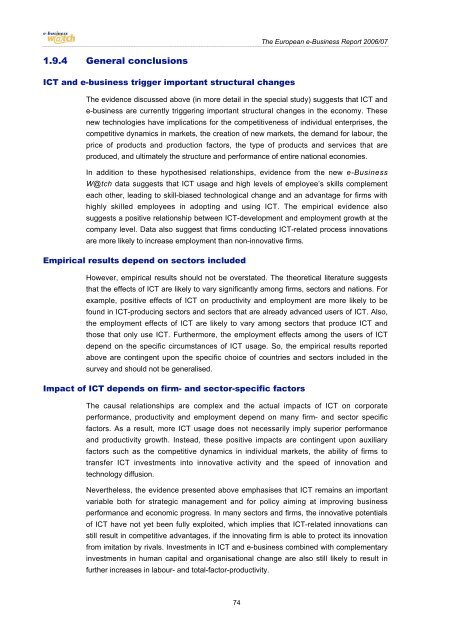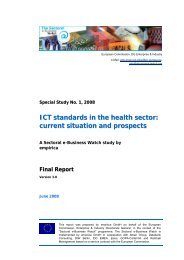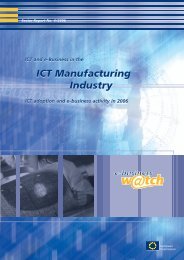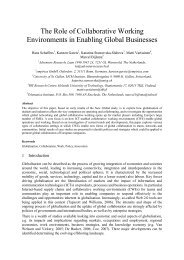The European e-Business Report The European e ... - empirica
The European e-Business Report The European e ... - empirica
The European e-Business Report The European e ... - empirica
- No tags were found...
You also want an ePaper? Increase the reach of your titles
YUMPU automatically turns print PDFs into web optimized ePapers that Google loves.
<strong>The</strong> <strong>European</strong> e-<strong>Business</strong> <strong>Report</strong> 2006/071.9.4 General conclusionsICT and e-business trigger important structural changes<strong>The</strong> evidence discussed above (in more detail in the special study) suggests that ICT ande-business are currently triggering important structural changes in the economy. <strong>The</strong>senew technologies have implications for the competitiveness of individual enterprises, thecompetitive dynamics in markets, the creation of new markets, the demand for labour, theprice of products and production factors, the type of products and services that areproduced, and ultimately the structure and performance of entire national economies.In addition to these hypothesised relationships, evidence from the new e-<strong>Business</strong>W@tch data suggests that ICT usage and high levels of employee’s skills complementeach other, leading to skill-biased technological change and an advantage for firms withhighly skilled employees in adopting and using ICT. <strong>The</strong> <strong>empirica</strong>l evidence alsosuggests a positive relationship between ICT-development and employment growth at thecompany level. Data also suggest that firms conducting ICT-related process innovationsare more likely to increase employment than non-innovative firms.Empirical results depend on sectors includedHowever, <strong>empirica</strong>l results should not be overstated. <strong>The</strong> theoretical literature suggeststhat the effects of ICT are likely to vary significantly among firms, sectors and nations. Forexample, positive effects of ICT on productivity and employment are more likely to befound in ICT-producing sectors and sectors that are already advanced users of ICT. Also,the employment effects of ICT are likely to vary among sectors that produce ICT andthose that only use ICT. Furthermore, the employment effects among the users of ICTdepend on the specific circumstances of ICT usage. So, the <strong>empirica</strong>l results reportedabove are contingent upon the specific choice of countries and sectors included in thesurvey and should not be generalised.Impact of ICT depends on firm- and sector-specific factors<strong>The</strong> causal relationships are complex and the actual impacts of ICT on corporateperformance, productivity and employment depend on many firm- and sector specificfactors. As a result, more ICT usage does not necessarily imply superior performanceand productivity growth. Instead, these positive impacts are contingent upon auxiliaryfactors such as the competitive dynamics in individual markets, the ability of firms totransfer ICT investments into innovative activity and the speed of innovation andtechnology diffusion.Nevertheless, the evidence presented above emphasises that ICT remains an importantvariable both for strategic management and for policy aiming at improving businessperformance and economic progress. In many sectors and firms, the innovative potentialsof ICT have not yet been fully exploited, which implies that ICT-related innovations canstill result in competitive advantages, if the innovating firm is able to protect its innovationfrom imitation by rivals. Investments in ICT and e-business combined with complementaryinvestments in human capital and organisational change are also still likely to result infurther increases in labour- and total-factor-productivity.74
















